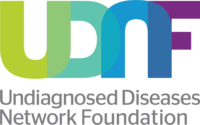13 Sep Undiagnosed Diseases Network Foundation Receives $2.5 Million Grant to Launch Patient Navigation Program
Washington, DC – The Undiagnosed Diseases Network Foundation (UDNF) announced today that it has received a $2.5 million grant from the Chan Zuckerberg Initiative (CZI) to launch a patient navigation and support program. The program will provide one-on-one case management to patients and families with undiagnosed and ultra-rare diseases, guiding them through the diagnostic and therapeutic odyssey.
“CZI understands that undiagnosed patients need more than just a diagnosis. Our participants face challenges with accessing social services, educational resources, appropriate medical care, compassionate mental health services, and a sense of community,” said Amy Gray, CEO of the UDNF. “The generous support from CZI will help us improve access, patient experience, and outcomes for undiagnosed and ultra-rare patients and their families.”
“UDNF’s Patient Navigator Program will work to support patients as they navigate their diagnostic journey, improving diagnostic outcomes and connecting patients to innovative research and treatment opportunities. The program will also help build the capacity of the UDN research institutions and researchers to engage patients as essential research partners, and enable patients to find and connect with other patients within and across conditions. At CZI, we believe patients hold the key to unlocking rare diseases, and we’re proud to work alongside UDNF in their efforts,” said Tania Simoncelli, CZI’s Vice President for Science in Society.
CZI and the UDNF are committed to ensuring that all rare disease patients have equitable access to healthcare and support services. Historically marginalized communities may experience lower diagnosis rates for rare diseases due to the inequitable distribution of resources and living in areas with few practicing specialists (Wojcik et al., 2022). The UDNF’s Patient Navigation Program will minimize barriers to underserved populations through culturally and linguistically relevant services, community outreach and education, geographic accessibility, advocacy, and holistic support.
“We know that it can take years and sometimes decades to get a diagnosis for these conditions,” Gray continued. “That’s why it’s so important to have help along the way. Our patient navigators will provide personalized support to help patients and families navigate the complex healthcare system, access the care they need, and build a community of support.”
“The diagnosis of novel or ultra-rare diseases is only the first step in the journey of patients and their families”, said Isaac S. Kohane, MD, PhD, Professor, Department of Biomedical Informatics, Harvard University and Principal Investigator of Data Management Coordinating Center at UDN Harvard site. “This new program developed by the UDNF and supported by CZI provides families with a sure-footed guide to the next steps including identifying or developing appropriate therapies.”
The Patient Navigation Program will begin as a pilot project launched in early 2024, enabling a comparative effectiveness study and patient outcomes assessment to guide further program development and refinement. Participants will initially be recruited from select Undiagnosed Diseases Network (UDN) sites. By 2025, the program will be available to any undiagnosed or ultra-rare disease patient.
Michele Herndon, MSN, RN was recently recruited by the UDNF to help launch the Patient Navigation Program as the Program Director. Michele has been a pediatric nurse, nurse leader and manager over the course of her career. For the past two decades, she has provided clinical care, overseen new initiatives, and managed teams of people in an academic hospital setting. Michele is also the mother to Mitchell who enrolled in the UDN in 2017 after 3 years of symptoms. After exome and genome sequencing and a model organism study using fruit flies, his gene mutation was identified by the UDN. Mitchell died in 2019 from the ultra-rare disease that was ultimately named after him, Mitchell Syndrome. Michele and her family started the Mitchell & Friends Foundation to support families and raise both awareness and money.
“As the UDNF embarks on this transformative endeavor, we sincerely thank CZI for their unwavering commitment to improving patient experiences and outcomes,” expressed Ms. Herndon. “Together, we look forward to creating a future where no patient feels alone or unheard, and every journey towards a diagnosis is accompanied by support and hope”.
About the Undiagnosed Diseases Network Foundation
The Undiagnosed Diseases Network Foundation is a patient-led nonprofit organization founded in 2023 committed to improving access to diagnosis, research, and care for all with undiagnosed diseases. The UDNF aims to foster collaboration among patients, clinicians, and scientists to enhance the quality of life of undiagnosed and ultra-rare disease patients and their families. For more information, please visit www.udnf.org.
About Undiagnosed and Ultra-rare Diseases
The search for a diagnosis for an undiagnosed or ultra-rare disease can be long and difficult. Patients may go from doctor to doctor without answers, and they may face treatment delays, lack of access to specialists, invasive and costly tests, emotional distress, and longing for community. There are more than 10,000 known rare diseases that affect about 1 in 10 people (or 30 million people) in the U.S. Led by undiagnosed and ultra-rare patients and their families, the UDNF offers hope for healthcare that embraces the unknown and pursues clinical and research solutions for patient wellbeing.



